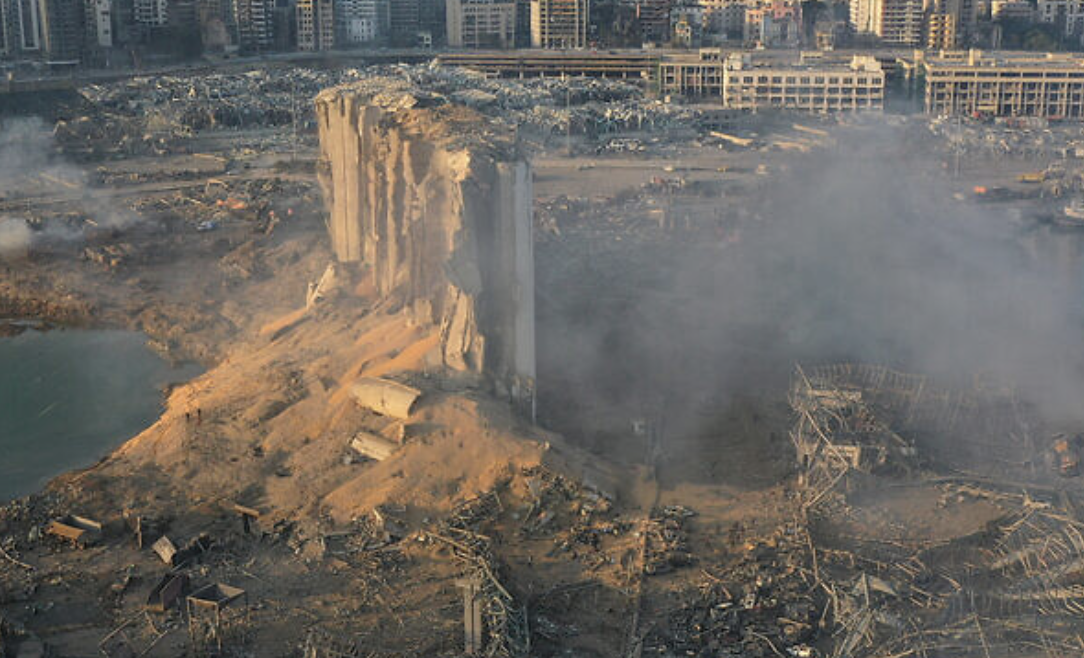Shocking visuals of a dual explosion in Lebanon’s Beirut surfaced on Tuesday. The aftermath of the Lebanon explosion has left the site looking like a warzone. Speculation arose as the explosion did not appear to be accidental. The death toll stands at 135. Lebanon’s health minister Hamad Hassan stated that the number of missing people raises the chances of an unprecedented casualty.
State of emergency
A two-week ‘state of emergency’ was imposed as authorities declared Beirut a ‘disaster city’.
Prime Minister Hassan Diab said: 2,750 metric tons of ammonium nitrate have been stored. It is typically used as an agricultural fertilizer.
Since 6 years, Ammonium nitrate was stored without safety measures at a port warehouse. It’s not yet clear what may have caused the explosion, but Diab has not alleged a purposeful act.
Mismangement of explosives
Investigators are now probing the devastating explosion. They are investigating possible negligence in the storage of tonnes of highly explosive fertiliser in a waterfront warehouse. The government has ordered the house arrest of numerous port officials. The investigation is looking at about 2,750 tonnes of confiscated ammonium nitrate.
Food security
French Foreign Minister Jean-Yves Le Drian has raised concerns about Lebanon’s food security. The massive Beirut blast damaged a major silo that contained the country’s grain supply.
“There will also be a food need that is indispensable because of the grain silos that explode,” he said. Le Drian also called on the international community to show solidarity with Lebanon, which was already reeling economically even before the disaster.
Former PM Hariri’s assassination
2005: Rafic Baha El Deen Al Hariri, former Lebanese prime minister and Sunni billionaire, assassinated in a suicide bombing attack in Beirut. He served as Prime Minister of Lebanon from 1992 to 1998 and then again from 2000 until his resignation on 20 October 2004. The four accused in the suicide bombing case are under trial in absentia at a Netherlands court. The Netherlands court is the world’s first international tribunal set up to probe terrorist crimes. It has cost at least $600 million since it opened its doors in 2009 following a UN Security Council resolution.
The bombings resulting in Hariri’s killing changed the Middle east scenario. Hariri was assassinated because he was perceived as “a severe threat” to Syrian control, legal experts said. Hariri’s assassination triggered a storm of protests and demonstrations which pushed out Syrian forces from Lebanon after thirty years.
The verdict
The Lebanon explosion took place just two days before the Hariri verdict was scheduled. Hezbollah chief Hassan Nasrallah refused to hand over the defendants. The case is hanging by a thread of mobile phone records. Instances like these raise serious doubts on the court’s credibility.
The Jakarta Post reported:
Four defendants went on trial in 2014 on charges including the “intentional homicide” of Hariri and 21 others. Attempted homicide of the 226 people who were wounded in the bombing, and conspiracy to commit a terrorist act.
Salim Ayyash, 56: accused of leading the team that carried out the bombing. It involved a truck packed full of explosives that detonated near Hariri’s motorcade on February 14, 2005.
Assad Sabra, 43, and Hussein Oneissi, 46: allegedly sent a fake video to the Al-Jazeera news channel claiming responsibility on behalf of a made-up group.
Hassan Habib Merhi, 54: accused of general involvement in the plot.
Hezbollah commander Mustafa Badreddine, was indicted by the court but is reportedly dead. He reportedly died while fighting with the Syrian government in May 2016.
Postponed verdict
The controversial Hariri verdict is postponed due to the devastating Lebanon explosion.
A UN-backed tribunal said it had suspended a verdict on the 2005 murder of former Lebanese premier Rafic Hariri following the deadly blast in Beirut. The court’s decision was due on Friday, August 7, 2020. The ruling stands postponed until August 18, said the court.
By Kunjan Ahluwalia

